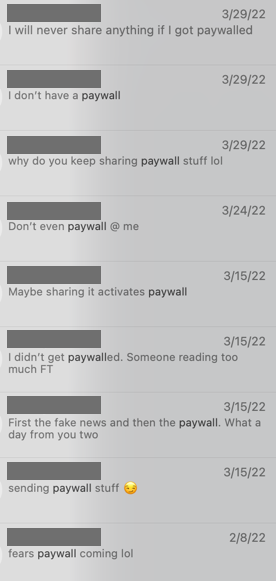I'm sure many of you have experienced peak Elon Musk fatigue in the news cycle, but an old tweet of his caught my eye. The Tesla/SpaceX/maybe-Twitter CEO called out the insincerity behind the Washington Post tagline "Democracy Dies in Darkness":
Ah yes, I see they decided to editorialize. Here’s what I actually said: pic.twitter.com/EPqtX7DLyl
— Elon Musk (@elonmusk) March 28, 2022
Elon attached a screenshot that clarified what he sent to the Jeff Bezos-owned Washington Post when the outlet sent questions to him for an article.
The Washington Post should change its tagline to "democracy dies behind our paywall". If you're so concerned about democracy, stop forcing people to pay for (allegedly) important news! Your boss Besos can certainly afford it, even after buying a support yacht for his yacht." - Elon Musk
The misspelling of "Bezos" is his, not mine. I did not reference this tweet to entertain you with the squabblings of the two wealthiest people in the world but to set the stage for a broader examination of subscription vs. advertising businesses.
Elon is poking fun at the Washington Post tagline, "Democracy Dies in Darkness," that adorns their masthead. He points out the hypocrisy of hiding important news behind a paywall and cutting off most of the democracy's participants from access.
Democracy dies behind a paywall
Does Musk have a point? Paywalls have become more commonplace than ever. I seem to run into a paywall daily now. It has become a running joke in one of my group chats:

We have the means to pay for access to journalism, but we still can't justify paying for all the journalism. Insider, Wall Street Journal, The New York Times, Bloomberg — the list goes on and on. We always hear about the burden of stacking streaming video subscriptions but not as much complaining about death by a thousand news subscriptions.
But this is not surprising given that seemingly everybody has at least one streaming subscription — but what percentage of your friends and family do you think pays for news? One of the largest news subscription businesses, The New York Times, only has 9.1 million subscribers. Compare that to Netflix's 221 million subscribers (warning: NYT article link may have a paywall).
The latest study I found noted that 48% of US publishers and 76% of digital newspapers had a paywall in place in 2019 — a 10% and 16% increase respectively from 2017, and I doubt things have slowed since then.
The number of publishers implementing a paywall is increasing, but are Americans willing to pay? Not really. Another study found that only 20% of Americans pay for online news, and those subscriptions are very concentrated on two prominent brands. From the study:
In the US, over half of these people have access to either the New York Times or the Washington Post,
80% of Americans gather news from free sources or through a different channel like TV. But with the number of free news sources waning, the variety of opinions they can find will also decrease. The concentration of paid subscriptions on two publications further illustrates a possible issue of the lack of variety in opinion consumed.
Freedom of speech is an essential tool of democracy, but what if you cannot even access that free speech? A democracy cannot function effectively if the most helpful and contextualized information is behind a paywall.


